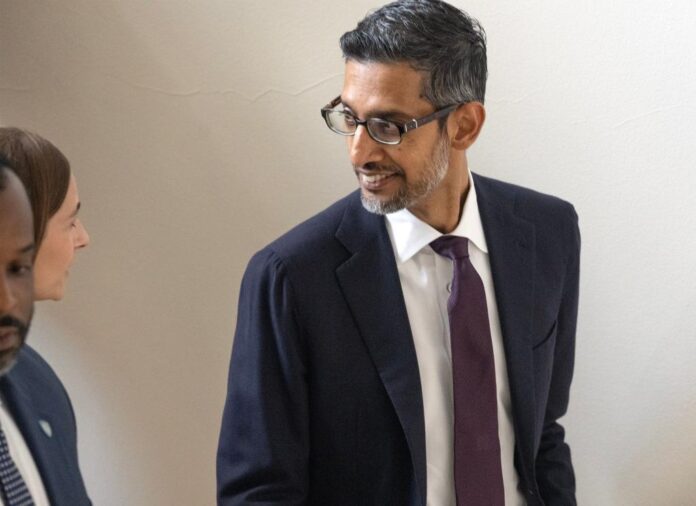
Google CEO Sundar Pichai once warned top executives that the company risked bad “optics” by pushing for its search engine to be the only option on Apple’s browser, according to emails submitted in the Justice Department’s landmark antitrust trial.
Pichai outlined his concerns in emails sent in 2007 to Google co-founders Larry Page and Sergey Brin as well as other company leaders.
Pichai, who was heading up the team responsible for Google’s Chrome browser, argued that the company should nudge Apple to allow customers to select their preferred search engine.
“I know we are insisting on default, but at the same time I think we should encourage them to have Yahoo as a choice in the pull down or some other easy option,” Pichai said in the email, according to Bloomberg.
“I don’t think it is a good user experience nor the optics is great for us to be the only provider in the browser,” Pichai added.
Pichai’s past remarks could lend support to the Justice Department’s key argument in the once-in-a-generation trial. The feds say Google pays more than $10 billion per year to smartphone makers like Apple and mobile carriers to secure default status on devices and block rivals from gaining market share.
Google has countered the argument by stating that customers choose its search engine because it is the best product of its kind. The Big Tech firm’s lawyers have also downplayed the importance of default status by asserting customers can change their search engine with just a few clicks.
On Tuesday, Justice Department attorneys also questioned Google executive Joan Braddi, who played a key role in negotiating the company’s search deals with Apple and was included in Pichai’s messages.
Braddi testified that Apple repeatedly pushed for “more flexibility” on search engine defaults through revised terms for the Google deal – including a 2014 agreement that cleared Apple to implement rivals’ search products in other countries.
When asked if Google currently pays a “significant amount of money” to Apple through the revenue-sharing deal, Braddi said: “It wasn’t always, but today, yes,” according to Bloomberg.
Last week, Microsoft CEO Satya Nadella, whose company operates the rival Bing search engine, said the “entire notion” that consumers have a choice in the online search market is “completely bogus” due to Google’s dominant hold on the market.
Google has a roughly 90% market share in online search, easily outpacing that of competitors such as Microsoft’s Bing and the privacy-focused DuckDuckGo.
Search advertising generated $42.6 billion in quarterly revenue, according to its latest earnings report in July — bucking a trend that has seen a slowdown in rivals Meta and Snap, Bloomberg reported.
Google’s long-term partnership with Apple has been a central focus during the antitrust trial, which is roughly halfway through its expected 10-week run time.
Google has been the default search engine for Apple’s Safari browser since 2002. The two companies most recently renegotiated the deal in 2021.
Longtime Apple executive Eddy Cue, the company’s senior vice president of services, previously defended the deal on the witness stand.
Cue told the court that Apple selected Google because “there certainly wasn’t a valid alternative we would have gone to at the time.” He added that Apple hasn’t developed its own search engine due to the quality of Google’s product.



